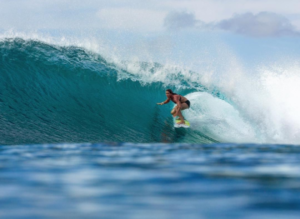
Courtney Conlogue – American Professional Surfer
The top-ranked professional surfer found her calling as a surfer at a young age while growing up in Santa Ana, California.
USA
Mood of Living July 11, 2017
Writer, conservationist, and Patagonia Ambassador Dylan Tomine discovered his love for nature at a young age. Born in the naturalesque town of Corvallis, Oregon, Tomine spent a great deal of time exploring his outdoor surroundings. Though his passion for fishing was innate, Tomine initially learned the ropes from his father. Tomine was able to turn his hobby of fly-fishing into a professional career following a few years of dedicated practice and education from a series of mentors.
Tomine traveled around the globe during his fly-fishing career, fishing in places such as Alaska, Patagonia, and Japan. His career as a fly-fisherman came to a halt following the closure of a steelhead fishery in Skykomish, Washington due to an alarming reduction in steelhead populations. Ever since, Tomine has advocated for the conservation of wild fish. Though no longer a professional fly fisherman, Tomine continues to channel his love for fish and produce dialogue regarding the importance of protecting nature, spending time outdoors, and cooking fresh, natural meals.
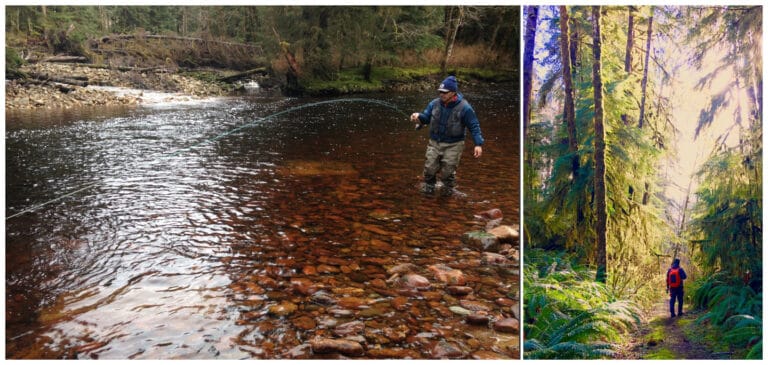
Mood of Living: Where were you born and raised? How did this environment impact your career path?
Dylan Tomine: I was born and mostly raised in Corvallis, Oregon. It’s a small, college town surrounded by fields, rivers, and forest. I spent my childhood riding my bike to fish the local streams and ponds and generally messing around in the woods. I think these activities created a deep appreciation for the natural world and the fun we can have in it.
MoL: What inspired you to begin fly-fishing? Where has your career in the sport taken you?
D.T: I was born crazy about fish, and that hasn’t changed in the years since. In fact, I think I started fishing at a very young age as a way to be able to touch and look at fish up close. My father is a fly fisherman, and I first started through him. And all through my life, I’ve found a series of mentors to add to my fly fishing education. I think the best part about my “career” in fly fishing is the people I’ve met and the places I’ve visited—everywhere from Argentine Patagonia to Alaska, Russia, Japan and the middle of the Pacific Ocean.
MoL: What influenced your focus on nature and fish conservation? What change do you hope to see in the industry and treatment of nature?
D.T: Throughout the 1990s I was on an obsessive quest to catch steelhead on flies. I traveled extensively on this quest, and fished about 40 days of the two-month season on my home river, the Skykomish. In 2000, the state closed the wild steelhead fishery on the Skykomish due to plummeting run sizes, and it hit my like a punch in the stomach. Until that time, conservation hadn’t even occurred to me, but the closure became a wakeup call of sorts, and I’ve been working to help protect wild salmon, steelhead and trout ever since. As far as industry and the treatment of nature, I think David Brower put it best when he said, “There’s no business to be done on a dead planet.” Acceptance of this simple truth by politicians and corporations would be a step in the right direction.
MoL: What message did you hope to share with your book Closer to the Ground: An Outdoor Family’s Year on the Water, in the Woods and at the Table?
D.T:I don’t think I had a real “message” with the book, I mostly just wanted to capture the experience of a specific time and place with people I love, and an appreciation for all of it. If there is a theme to the book, I would say it’s gratitude. For my family, a lot of life revolves around outdoor activities and the resulting meals, so it was natural to make that the focus of the story.
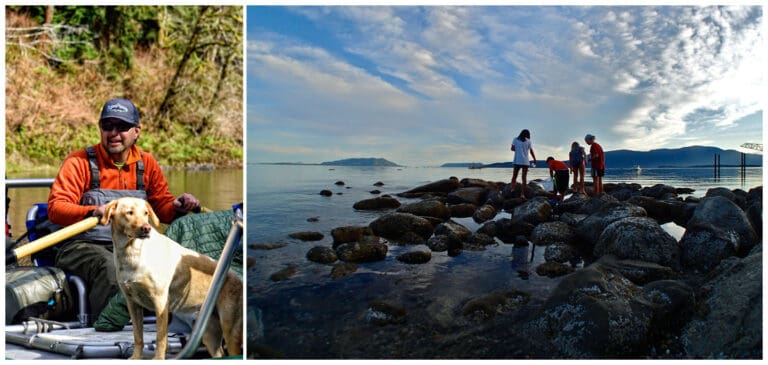
MoL: How did the experience of living and writing the book impact your family? How do you hope the richness of the experience will inspire others?
D.T: Again, I didn’t really set out to inspire anyone with the book. But I think if it gets someone excited about going outside with their kids, or cooking with them, I would consider that a positive. Unlike some of the other books it’s compared to, Closer to the Ground isn’t based on a one-year experiment or any kind of intentional change. I simply wrote about a single year in the life we were already living.
MoL: What other projects are you working on alongside writing and fly fishing? Do you still have a blueberry farm?
D.T: I am no longer a blueberry farmer—it turns out I’m a lot better at fishing and writing than trying to make a farm work. But it was an incredible experience, and I certainly learned more than I could have imagined. I am currently working on a fish conservation film and a novel about environmental terrorism.
MoL: What do you like to cook with your family? Do you have a recipe you can share?
D.T: We like to cook all kinds of wild foods, but my favorite meal to make (and eat), by far, is salt-grilled salmon shioyaki. “Shio” means salt in Japanese, and that’s pretty much all there is to the recipe. You just need really high quality, high-fat-content salmon, like summer ocean king salmon, Copper River king salmon, or Columbia River spring Chinook. Cut into inch-thick steaks, sprinkle with about twice as much salt as you would if you were eating it right away, then refrigerate overnight. Throw it on a hot grill and cook about 3 minutes a side, total 6 minutes. Serve with steamed rice and simple, fresh vegetable. More details in the paperback version of Closer to the Ground, but that should get you started.
Tomine spends as much time as possible with his family in the great outdoors, sourcing and cooking food together.
MoL: What social impact do you hope to have on the world? Are you involved in philanthropic projects alongside your conservation efforts?
D.T: I suppose “philanthropic” could imply that I have money to give, which I don’t, so most of my efforts focus on fish and habitat conservation. But I also believe these efforts benefit humans as much as they do fish—we need clean water and wild places, too. And if any of my work can encourage others to participate, then I think that’s a benefit as well.
MoL: Do you have a favorite quote?
D.T: My current favorite: “If a politician says he doesn’t believe in climate change, he’s either a dumbass or a crook.” –Yvon Chouinard
MoL: Where is your favorite place to go for peace of mind?
D.T: For peace of mind, my favorite place is the Elwha River here in Washington state. As the site of the world’s largest (to date) dam-removal project, the Elwha is uplifting and exhilarating to experience as it comes back to life. It gives me peace of mind because it demonstrates that we can fix our past wrongs, and that Mother Nature is incredibly resilient—the recovering wild salmon, the return of native vegetation, and the rebuilding delta habitat are proof.
MoL: What advice would you share with others who hope to pursue their passions?
D.T: Advice? I don’t think I’m in much of a position to give advice on this, but I would say that when you are doing something you love and want to learn more, people will appear to teach and mentor you. In many cases, they will become lifelong friends. And that is, for me, the greatest reward for pursuing your passions.
Photography courtesy by Dylan Tomine

The top-ranked professional surfer found her calling as a surfer at a young age while growing up in Santa Ana, California.
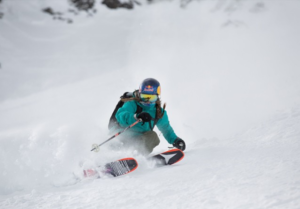
Parker found her true passion in freeskiing and used that passion to create avalanche safety program S.A.F.E.A.S.
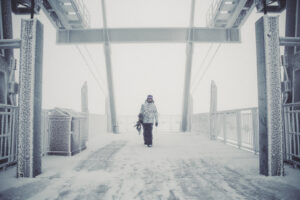
Clark finds fulfillment in utilizing her success to help others in the snowboarding community.